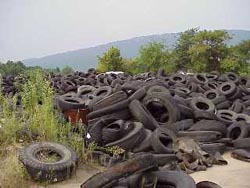
The Waste Tire Problem
It is estimated that 5,000,000 waste tires are generated annually in Tennessee and several million waste tires are currently stockpiled or illegally dumped across the state.
In addition to littering our landscape and marring the natural beauty of Tennessee’s hills and stream banks, the improper disposal of whole tires often results in health and environmental hazards.
- Whole tires provide convenient habitats for rodents.
- They hold water and become excellent breeding grounds for mosquitoes that carry diseases.
- Improperly stored tires present a fire hazard. They trap oxygen that will constantly feed the flames which emit noxious, air polluting smoke.
- When tires are illegally burned, oils and soot can run off and contaminate both surface and ground water.
Waste Tire Disposal
Current State law prohibits the storage and/or disposal of waste tires without a permit. Whole tires are banned from being disposed in a landfill.
Counties are required by state law to provide to its citizens a site for the collection and temporary storage of waste tires. The county designated sites must meet permitting and storage regulations for the safe storage of waste tires. Contact the office of your county executive or solid waste department to learn the location of the waste tire storage site in your county.
The Tennessee Department of Environment and Conservation provides a grants to operate these county sites. Collected tires may be processed for recycling or beneficial end use.
Recycling / Reuse Options For Tires
- Tire-derived fuel--utilities, paper mills, cement kilns, and other tire-to-energy facilities can use tires as a supplemental fuel with wood and coal.
- Civil engineering--used as a road base material, backfill behind retaining walls or in embankments, crash barriers, erosion prevention, soil amendment, landfill drainage layer, fill material in French drains and subsurface sewage disposal systems.
- Asphalt paving--as crumb rubber, scrap tire material can be used in asphalt paving.
- Pyrolysis--rubber is decomposed into recoverable components: oil, char, and gas.
- Other products--used in molded rubber products such as shoes, dock bumpers, mats, landscaping mulch.
How To Reduce The Waste Tire Problem
Proper driving habits and care of tires can extend their life and reduce the number going to the scrap tire pile. Keep your tires inflated to the proper pressure, correctly balanced and aligned, and rotated at regular intervals.
Retreaded tires are an alternative to those made from all new materials. Instead of being disposed, old tire casings have a new tread, and sometimes sidewall rubber, vulcanized to the prepared surface.
For more information about tires please visit:
Frequently
Asked Questions
and
Policy Guidelines for Civil Engineering Applications Approved
for Beneficial End Use of Waste Tires
For more information on Tennessee's Waste Tire Program, please contact Louis Bordenave at 615-532-0095 or by email at [email protected].



